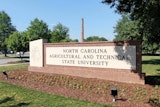ATLANTA
Five years after the University System of Georgia started an initiative to boost enrollment of Black males, officials are seeing results, but they also realize more needs to be done.
This past weekend, the system’s African-American Male Initiative held its inaugural Best Practices Conference at Kennesaw State University to share the ideas and solutions participating institutions have come up with to make sure more Black males are being recruited, retained and graduated from Georgia’s colleges and universities.
When University System of Georgia officials found five years ago that African-American males were outnumbered by their female counterparts nearly 2-to-1, they started AAMI to turn those disproportionate numbers around, said AAMI project director, Arlethia Perry-Johnson.
“The data is pretty disconcerting. It would be more disconcerting if we were doing nothing,” she said, citing statistics that showed one public school district in Georgia graduated from high school just 54 percent of its Black males, and that rate was the highest of Georgia’s seven largest K-12 school districts.
“That’s how broad and pervasive this issue is for this state,” said Perry-Johnson. “It’s not a flash in the pan issue. It’s pervasive throughout this state and throughout this nation.”
AAMI’s work seems to be making a difference.
Since the AAMI was formed in 2002, African-American male enrollment on University of System of Georgia campuses has increased 24.5 percent, up from 17,068 students to 21,249 students.
“We’re closing the gap,” said Perry-Johnson. “What we’ve done is essentially close the plug in the deluge so that’s why we believe there’s more work to do.”
Some of the programs highlighted at the conference include:
-
University of Georgia education professor Dr. Deryl Bailey developed a program called Gentlemen on the Move, which selects a group of African-American male high school students who are involved in weekly academic work and social skills sessions for a week-long Summer Academy at the University of Georgia.
-
Summer programs at Albany State University and Savannah State University bring African-American male youngsters on campus to mentor, teach and prepare students for collegiate pursuits.
-
Georgia Tech annually hosts the Focus Program that gives nearly 300 African American students across the country an opportunity to visit the school, get introduced to graduate degree programs and encourage them to get advanced degrees.
-
Costal Georgia Community College’s Minority Outreach Program brings 70-80 rising seventh grade African-American males to campus for an intense, five-week summer program to teach them math and language arts. But the students are also tracked for five years, get tutorial assistance, counseling and career experience activities during a Saturday academy. Over the 12 years of the program’s existence, 85 percent of the students have completed high school and attended at least two years of college.
Dr. Rosa Smith, former president of the Schott Foundation and publisher of “Public Education and Black Male Students: A State Report Card,” was a speaker at the conference.
Smith says African-American male students should be reached long before they move onto college campuses – or even into K-12 institutions.
“People need to know how important the first five years of life is for children,” she said. “But it’s something about our system. I actually think Black boys carry the racial burden of our system and our society.”
Nearly 300 representatives from most of the system’s 35 institutions attended the two-day conference, specifically those institutions participating in the AAMI, along with students and other dignitaries.
In addition to giving institutions a chance to share their ideas, the conference also encouraged students to talk about ways they can be more successful. Author Kevin Powell led a forum open to Black male students only so they could have an unfettered dialogue about the issue.
There was also an awards ceremony recognizing those who’ve contributed to finding answers to the situation.
“But this is by no means a celebration,” Perry-Johnson said. “It’s a focus on what we’re doing right so more people can focus on doing that.”
–Add Seymour Jr.
There are currently 0 comments on this story.
Click here to post a comment
© Copyright 2005 by DiverseEducation.com















